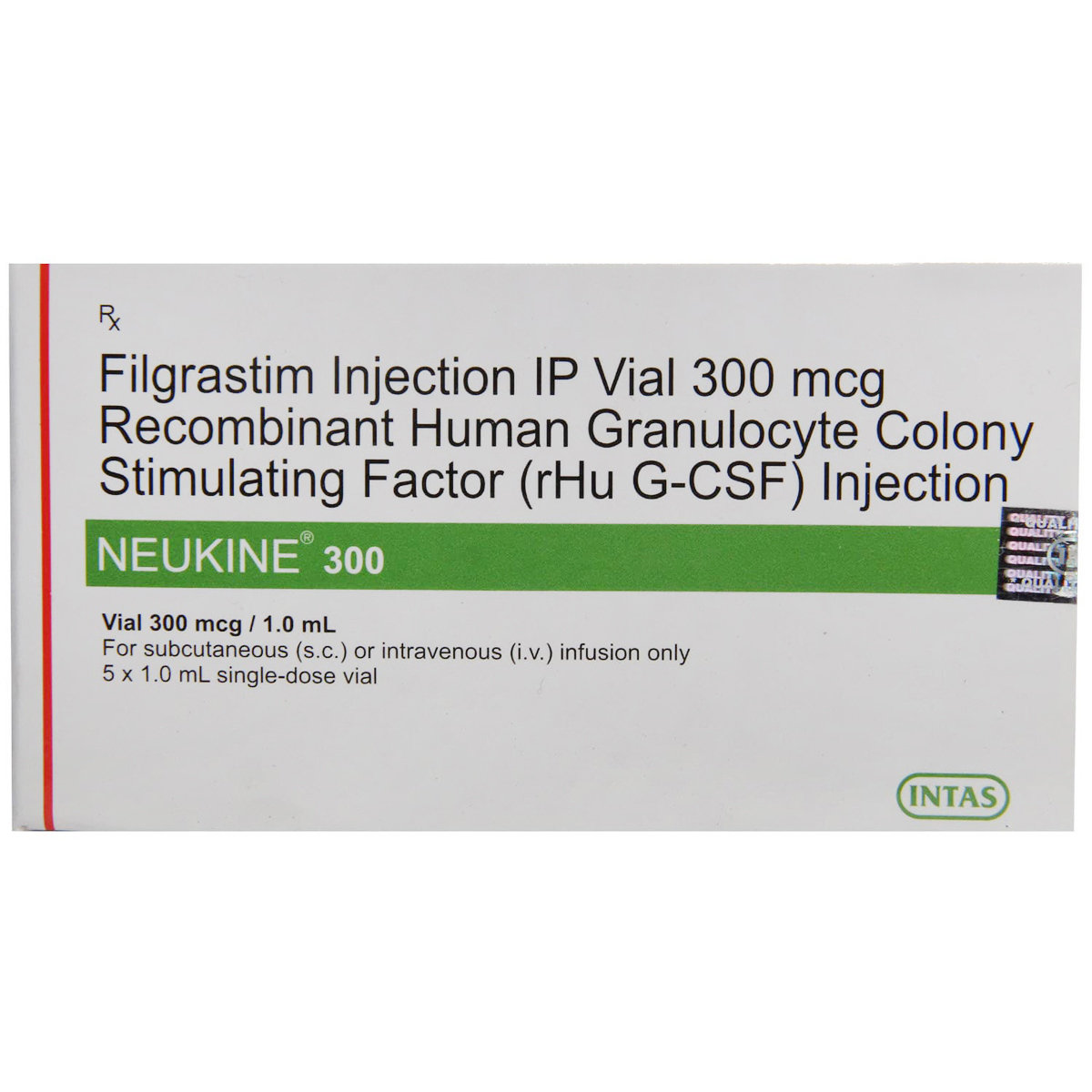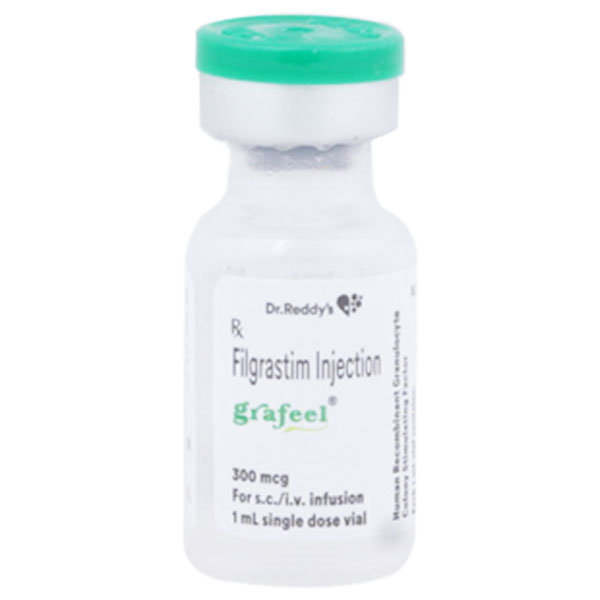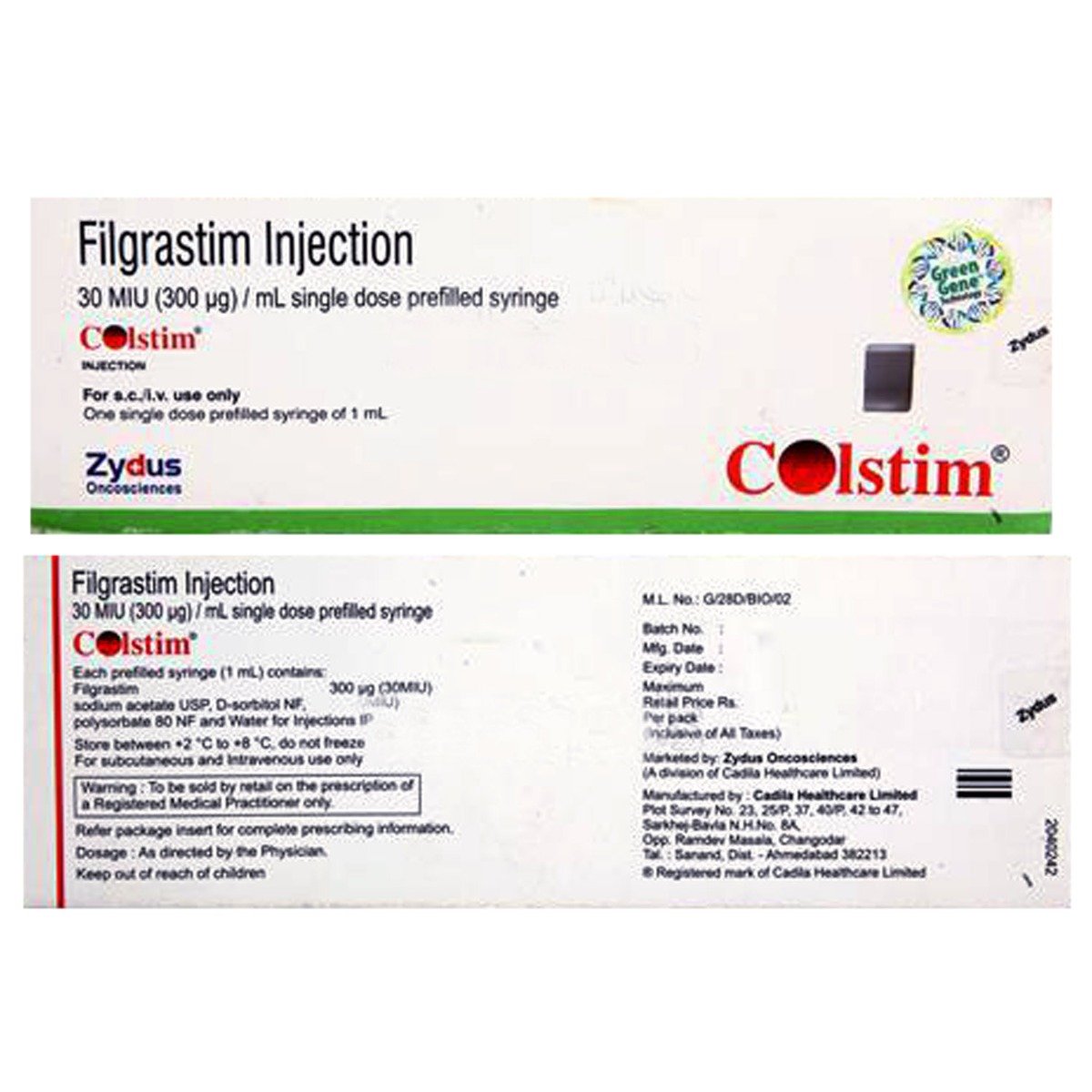- Home
- XPHIL 300MCG INJECTION
XPHIL 300MCG INJECTION Substitute
XPHIL 300MCG INJECTION Substitute
Medicine Composition:
FILGRASTIM-300MCGAll Substitutes & Brand Comparisons
RX
COLSTIM 30MIU/300MG INJECTION
Cadila Pharmaceuticals Ltd
₹576
(₹518.4 per unit)
74% CHEAPERRX
Neukine 300 Injection 1 ml
Intas Pharmaceuticals Ltd
₹587.5
(₹528.8/ 1ml)
73% CHEAPERRX
Grafeel Injection 1 ml
Dr Reddy's Laboratories Ltd
₹724
(₹651.6/ 1ml)
67% CHEAPERRX
ANCOUNT 300MG INJECTION
₹1078
(₹970.2 per unit)
52% CHEAPERRX
Out of StockFilcad 300 mcg Injection 1 ml
Cadila Pharmaceuticals Ltd
₹1217.5
(₹1071.4/ 1ml)
47% CHEAPERRX
Axokine Injection 1 ml
Axiommax Oncology Pvt Ltd
₹1200
(₹1080.0/ 1ml)
46% CHEAPERRX
Out of StockFrastim 300 mcg Injection 1 ml
RPG Life Sciences Ltd
₹1217.5
(₹1095.8/ 1ml)
45% CHEAPERRX
Endokine 300 mcg Injection 1 ml
Intas Pharmaceuticals Ltd
₹1217.5
(₹1095.8/ 1ml)
45% CHEAPERRX
LUPIFIL 300MG INJECTION
Lupin Ltd
₹1217.5
(₹1095.8 per unit)
45% CHEAPERRX
Neukine 300 mcg Injection 1 ml
Intas Pharmaceuticals Ltd
₹1239
(₹1115.1/ 1ml)
44% CHEAPERRX
Out of StockColstim Injection 1 ml
Zydus Cadila
₹1271.9
(₹1144.71/ 1ml)
43% CHEAPERRX
Emgrast 300 mcg Injection 0.5 ml
Emcure Pharmaceuticals Ltd
₹1299
(₹2338.2/ 1ml)
15% COSTLIERRX
Out of StockFilneon 300 mcg Injection 0.5 ml
Neon Laboratories Ltd
₹1303
(₹2345.4/ 1ml)
15% COSTLIERRX
Apligraf 300 mcg Injection 0.5 ml
Axiommax Oncology Pvt Ltd
₹1217
(₹2434.0/ 1ml)
20% COSTLIERRX
Out of StockFillif 300 mcg Injection 0.5 ml
Torrent Pharmaceuticals Ltd
₹1674
(₹3013.2/ 1ml)
48% COSTLIER

When Should You Consider Switching from XPHIL 300MCG INJECTION?
Patients may explore substitutes in the following scenarios:
- High monthly cost of XPHIL 300MCG INJECTION
- Non-availability in local pharmacies
- Generic recommendation by a doctor
- Side effects or better tolerability with alternatives
What to Know Before Switching
Before you switch from XPHIL 300MCG INJECTION to another medicine, here are some important points to keep in mind:
Same salt, different brands:
Most substitutes contain the same active ingredient - FILGRASTIM-300MCG, but the fillers, coating, or manufacturing quality may vary slightly.
Consult your doctor first:
Even if the salt is the same, your doctor can confirm if the substitute is right for your condition, dosage, and health history.
Watch out for allergies or reactions:
Some people may react differently to certain brands due to inactive ingredients. If you notice any side effects, inform your doctor immediately.
Price ≠ effectiveness:
A lower-priced substitute doesn't mean it's less effective. Many generic medicines work just as well as branded ones.
Check the dosage form and strength:
Always match the substitute’s strength (e.g., 5mg, 10mg) and form (tablet, capsule, syrup) with what your doctor prescribed.
Uses
XPHIL 300MCG INJECTION is used in the treatment of neutropenia (low neutrophil count). The detailed uses of XPHIL 300MCG INJECTION are as follows:
- Treats and Prevents Chemotherapy-Induced Neutropenia: XPHIL 300MCG INJECTION is used to treat and prevent neutropenia in patients receiving myelosuppressive anticancer medications, thereby reducing the risk of infection.
- Treats Severe Chronic Neutropenia: XPHIL 300MCG INJECTION is prescribed for patients with chronic neutropenia (such as congenital, cyclic, or idiopathic types) to boost neutrophil production and prevent recurrent infections.
- Supports Recovery After Bone Marrow Transplant: XPHIL 300MCG INJECTION helps shorten the duration of neutropenia and prevents related complications (such as fever and infection) following bone marrow transplantation.
- Mobilizes Stem Cells for Collection: XPHIL 300MCG INJECTION is used to stimulate the release of hematopoietic stem cells from the bone marrow into the bloodstream, making them easier to collect for stem cell transplantation.
- Manages Neutropenia in HIV Patients: XPHIL 300MCG INJECTION may be used to restore white blood cell counts in HIV patients with neutropenia, thereby reducing their risk of acquiring infections.
Medicinal Benefits
XPHIL 300MCG INJECTION contains ‘Filgrastim’ is a white blood cell growth factor. It belongs to a group of proteins called cytokines and is very similar to a natural protein (granulocyte-colony stimulating factor) produced by your body. XPHIL 300MCG INJECTION works by stimulating the bone marrow (the tissue where new blood cells are made) to produce more white blood cells that help fight infection. XPHIL 300MCG INJECTION is used to improve white blood cells during cancer treatment (chemotherapy), bone marrow transplantation, severe chronic neutropenia (low number of a type of white blood cells), neutropenia in patients with HIV infection and before stem cell donation.
FAQs
The substitutes of XPHIL 300MCG INJECTION contain the same active salt(s) - FILGRASTIM-300MCG. However, they may differ in price, manufacturing quality, and inactive ingredients. Speak to your doctor to find a suitable option.
Switching to a generic substitute medicine in the place of XPHIL 300MCG INJECTION is often possible if it has the same salt, strength, and dosage form. But always check with your doctor before making any changes to your medication.
Generics versions of XPHIL 300MCG INJECTION are typically more affordable because they don’t include the original brand's research, development, and marketing costs. They contain the same active ingredient and are approved for safety and effectiveness.
Most people don’t notice any difference. However, some may react to different fillers or coatings. If you notice any unusual symptoms after switching, consult your doctor.
Make sure the new medicine has the same active salt, strength, dosage form. Always confirm the change with your doctor or pharmacist.
Substitutes of XPHIL 300MCG INJECTION meet the same safety and efficacy standards as XPHIL 300MCG INJECTION, but small differences in absorption or formulation can exist. A doctor can help you choose the right one for your needs.
Yes. Substitutes of XPHIL 300MCG INJECTION may vary in color, size, or shape due to differences in manufacturing and branding, but this does not affect how they work.
Yes, it’s generally safe to switch between multiple substitutes of XPHIL 300MCG INJECTION if they have the same salt and strength. However, always inform your doctor so they can monitor how your body responds.
Yes, many people safely use substitutes of XPHIL 300MCG INJECTION for long-term treatment. Just ensure it’s done under medical supervision.
If your symptoms stay under control or lab results remain stable, the substitute for XPHIL 300MCG INJECTION is likely working well. Regular follow-ups with your doctor are important.
Absolutely. Even with the same salt, small differences can affect how your body responds when switching from XPHIL 300MCG INJECTION to its substitute. Always consult your doctor before switching.
XPHIL 300MCG INJECTION is used to treat neutropenia (lack of certain white blood cells) caused by cancer, bone marrow transplant, chemotherapy, bacterial infections or other conditions.
XPHIL 300MCG INJECTION contains 'Filgrastim' is a growth factor that stimulates the bone marrow to produce white blood cells. These cells protect the body against infections.
No, XPHIL 300MCG INJECTION is not recommended to patients with spleen disorder. It may cause your spleen to become enlarged, and it could rupture. If you experience pain in the left upper stomach/abdominal area or left shoulder, contact your doctor immediately.
If you are being treated for severe chronic neutropenia for a longer period, XPHIL 300MCG INJECTION may cause blood in your urine (haematuria). Your doctor may regularly test your urine if you experience this side effect or if a protein is found in your urine (proteinuria).
XPHIL 300MCG INJECTION should be used with caution in patients with kidney diseases. Dose adjustments may be necessary. XPHIL 300MCG INJECTION cause breathlessness (dyspnoea), tachycardia & wheeze, and even death. If you have had a history of asthma, the more possibility of these systemic allergic-like reactions. Please inform your doctor.
XPHIL 300MCG INJECTION to be taken with caution, especially if you have had heart problems. The dose may have to be adjusted by your doctor. In some cases, XPHIL 300MCG INJECTION causes inflammation of the aorta (the large blood vessel which transports blood from the heart to the body) symptoms can include fever, abdominal pain, malaise, back pain, and increased inflammatory markers. Tell your doctor if you experience those symptoms. Please inform your doctor before taking XPHIL 300MCG INJECTION.
Yes, XPHIL 300MCG INJECTION may interfere with certain lab tests such as bone imaging and blood tests (elevation in lactate dehydrogenase and alkaline phosphate), possibly causing false test results. Make sure your doctor and laboratory staff know you use XPHIL 300MCG INJECTION.
XPHIL 300MCG INJECTION is generally safe when used as prescribed by your doctor. However, like all medications, it can cause side effects, some of which may be serious. Common side effects are usually mild and temporary. Still, following your doctor's instructions and attending regular check-ups to monitor your health is essential. If you experience any unusual or persistent symptoms, contact your doctor promptly. Additionally, inform your doctor about your medical history, allergies, and other medications to minimize the risk of adverse reactions. You can minimize potential risks and ensure safe treatment by using XPHIL 300MCG INJECTION as directed and under medical supervision.
There is no clear evidence that XPHIL 300MCG INJECTION causes cancer. Sharing your medical history and risk factors with your doctor is crucial. They'll explain the benefits and potential risks of taking XPHIL 300MCG INJECTION, including any long-term effects. If you have concerns about cancer or other health issues, consult your doctor or a qualified healthcare professional for personalized advice.
XPHIL 300MCG INJECTION stimulates the bone marrow to generate a large number of white blood cells, which might cause bone pain. This pain is frequently felt in the bones of the thighs, hips, and upper arms. The pain is usually temporary and resolves once treatment is stopped or the dose is adjusted. Inform your doctor if you are experiencing heavy pain, and your doctor may prescribe medications to manage discomfort.
XPHIL 300MCG INJECTION is used to treat children receiving chemotherapy or suffering from severe low white blood cell count (neutropenia). The doctor will decide the dose of XPHIL 300MCG INJECTION based on your child's age, body weight and condition. Follow your doctor's directions to achieve better results.
XPHIL 300MCG INJECTION should be used with caution if you have kidney disease. It may increase the risk of kidney problems, so your doctor will monitor you closely. They may adjust your dose or watch for signs of kidney issues. If you have kidney disease, tell your doctor before taking XPHIL 300MCG INJECTION, and they'll help you use it safely.
XPHIL 300MCG INJECTION may cause dizziness, drowsiness, and tiredness.do not drive or operate heavy machinery if you feel dizzy.
Common side effects of XPHIL 300MCG INJECTION may include thrombocytopenia (low platelets level), anaemia (low red blood cell), headache, diarrhoea, vomiting, nausea, alopecia (unusual hair loss), tiredness, soreness, swelling of the digestive tract, fever. Most of these side effects do not require medical attention and will resolve gradually over time. However, you are advised to talk to your doctor if you experience these side effects persistently.
XPHIL 300MCG INJECTION should only be used during pregnancy and breastfeeding if clearly needed and under a doctor's guidance. If you're pregnant or breastfeeding, consult your doctor before taking XPHIL 300MCG INJECTION to discuss the benefits and risks and make an informed decision for you and your baby.
Buy best Hematopoietic System products by
Intas Pharmaceuticals Ltd
Zydus Cadila
Cipla Ltd
Dr Reddy's Laboratories Ltd
Biocon Ltd
Emcure Pharmaceuticals Ltd
Wockhardt Ltd
RPG Life Sciences Ltd
Lupin Ltd
Anthem Bio Pharma
Johnson & Johnson Pvt Ltd
La Renon Healthcare Pvt Ltd
Panacea Biotec Ltd
Zydus Healthcare Ltd
Alniche Life Sciences Pvt Ltd
Micro Labs Ltd
Torrent Pharmaceuticals Ltd
Hetero Drugs Ltd
Hetero Healthcare Pvt Ltd
Merynova Life Sciences India Pvt Ltd
Natco Pharma Ltd
Neon Laboratories Ltd
Reliance Formulation Pvt Ltd
Septalyst Lifesciences Pvt Ltd
Serum Institute Of India Pvt Ltd
Alkem Laboratories Ltd
Aureate Healthcare
Axiommax Oncology Pvt Ltd
Biokindle Lifesciences Pvt Ltd
Bioniche Life Sciences Inc
Cadila Healthcare Ltd
Celon Laboratories Pvt Ltd
Gennova Biopharmaceuticals Ltd
Hospimax Healthcare Pvt Ltd
Msn Laboratories Pvt Ltd
Myren Life Science India Pvt Ltd
Rene Lifescience
Zuventus Healthcare Ltd
Abbott India Ltd
BDR Pharmaceuticals Internationals Pvt Ltd
Bharat Serums and Vaccines Ltd
Cadila Pharmaceuticals Ltd
Concord Biotech Ltd
Delarc Pharmaceuticals Pvt Ltd
Eris Life Sciences Ltd
Fresenius Kabi India Pvt Ltd
Glenmark Pharmaceuticals Ltd
Hetero Healthcare Ltd
Lg Life Sciences India Pvt Ltd
Lucien Life Sciences
MEDICAMEN BIOTECH LTD
Mankind Pharma Pvt Ltd
Novartis India Ltd
Plasoron Biotech Pvt Ltd
Reliance Life Sciences Pvt Ltd
Sanzyme Pvt Ltd
United Biotech Pvt Ltd
Aar Ess Remedies Pvt Ltd
Abl Biotechnologies Ltd
Adley Formulations
Admac Lifesciences(Oncology)
Adonis Laboratories Pvt Ltd
Aegis Pharma Labs Pvt Ltd
Ajanta Pharma Ltd
Amzenex Healthcare Pvt Ltd
Balint Pharmaceuticals
Biokind Life Science
Bioviz Technologies Pvt Ltd
Calren Care Lifesciences Pvt Ltd
Celera Pharma Pvt Ltd
Celestial Biologicals Ltd
Concord Laboratories Pvt Ltd
Core Claris Lifesciences Ltd
Crossland
Cryzer Formulation Pvt Ltd
Del Trade International Pvt Ltd
Genix Lifescience Pvt Ltd
GlaxoSmithKline Pharmaceuticals Ltd
Gufic Bioscience Ltd
Innovcare Life Sciences Pvt Ltd
J B Chemicals & Pharmaceuticals Ltd
Levin Life Sciences Pvt Ltd
Lifeline Systems Pvt Ltd
Medion Biotech Pvt Ltd
Piramal Enterprises Ltd
Ranbaxy Laboratories Ltd
Renakart Life Sciences Pvt Ltd
Roche Diagnostics India Pvt Ltd
Sanofi India Ltd
Sarabhai Chemicals (India) Pvt Ltd
Sayre Therapeutics Pvt Ltd
Shilpa Medicare Ltd
Swarion Life Sciences Pvt Ltd
Torso Lifesciences
Vhb Life Sciences Inc
Zenlabs Ethica Ltd






